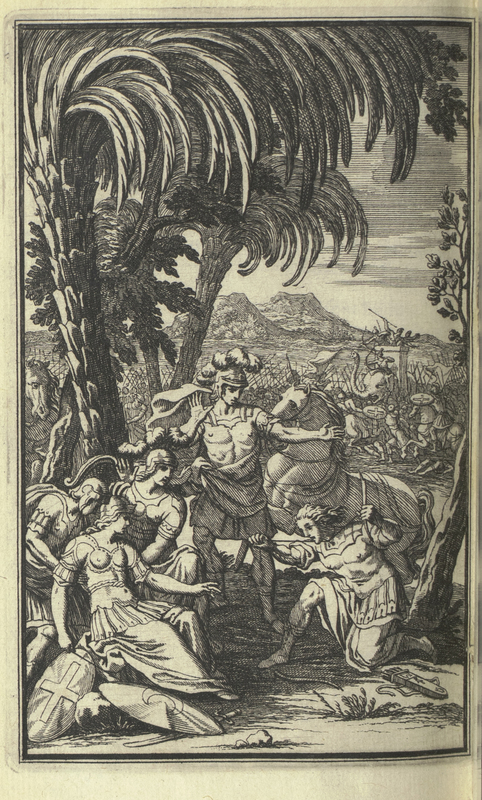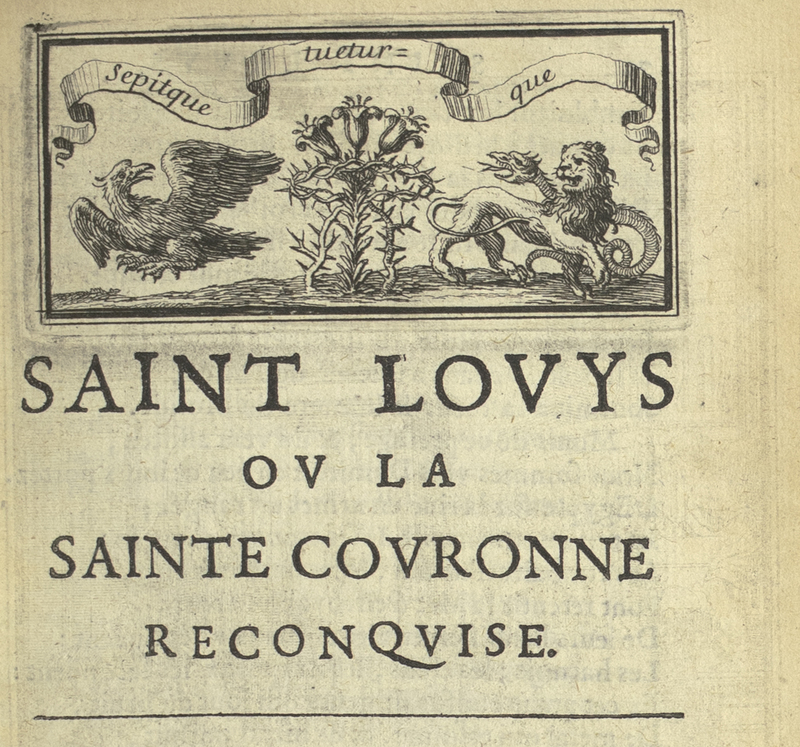Search
-
 Still image
Still imageZahide's Vision of Mary
Chauveau, François, 1613-1676An engraving depicting a scene from the seventeenth book of the epic poem, Saint Louys, in which a recovered Zahide sees a vision of the Virgin Mary surounded by angels and holding a cross, and is converted. -
 Still image
Still imageArchambaut de Bourbon Defeates Mirème
Chauveau, François, 1613-1676An engraving depicting a scene from the sixteenth book of the epic poem, Saint Louys, in which Archambaut de Bourbon battles and defeats the sorcerer, Mirème, who has created demonic illusions and traps to keep the cruasders from accessing the Matariya Fountain and curing Saint Louis of his poisoned arrow wound. -
 Still image
Still imageThe Death of Alfasel
Chauveau, François, 1613-1676An engraving depicting a scene from the fifteenth book of the epic poem, Saint Louys, in which Alfasel (bottom right), who had accidentally wounded Zahide (bottom left) with a poisoned arrow while aiming for Lisamante, commits suicide. Meanwhile, Zahide is taken prisioner while in the background, the battle between the crusaders and the Saracens continues. -
 Still image
Still imageThe Martyrdom of Robert d'Artois
Chauveau, François, 1613-1676An engraving depicting a scene from the fourteenth book of the epic poem, Saint Louys, in which the body of the martyred Robert d'Artois, the brother of Saint Louis who fell in battle during the siege of Mansourah, is laid to rest in a tomb decorated with scenes of battle by a group of angels. -
 Still image
Still imageLisamante Kills Mélédin
Chauveau, François, 1613-1676An engraving depicting a scene from the thirteenth book of the epic poem, Saint Louys, in which Lisamante, having been taken prisoner by the Saracens, is urged by a vision of Judith to kill Sultan Mélédin, who had intended to marry Lisamante. -
 Still image
Still imageArchambaut de Bourbon Defeats the Dragon
Chauveau, François, 1613-1676An engraving depicting a scene from the twelfth book of the epic poem, Saint Louys, in which Archambaut de Bourbon, wearing the armor of his ancestor, Aymon de Bourbon, battles and defeats the dragon stopping the crusaders from building a bridge across the Nile. -
 Still image
Still imageThe Deaths of Mélédor, Almasonte, and Alzir
Chauveau, François, 1613-1676An engraving depicting a scene from the eleventh book of the epic poem, Saint Louys, in which, while in disguse as crusaders, Mélédor and Alzir infiltrate the French camp to rescue Almasonte and Zahide, who they then unknowingly duel, resulting in Zahide killing Mélédor (bottom right), and Alzir killing Almasonte and then committing suicide (center left). -
 Still image
Still imageAlégonde Interprets the Destruction of the Poisoned Armor
Chauveau, François, 1613-1676An engraving depicting a scene from the tenth book of the epic poem, Saint Louys, in which, following the destruction of the poisoned armor gifted to Saint Louis by the Sultan's representatives, the hermit and widow of Aymon de Bourbon, Alégonde, is consulted to interpret the sign, and informs the prelates that only a member of the House of Bourbon can battle the dragon blocking the crusaders path. -
 Still image
Still imageSaint Michael Causes the Nile to Recede
Chauveau, François, 1613-1676An engraving depicting a scene from the ninth book of the epic poem, Saint Louys, in which the Archangel Michael forces the Nile to recede from where it had flooded, leaving the path clear for the crusaders. In the back ground, a fleet of ships can be seen, referencing a later event in the same book where Archambaut de Bourbon engages in a naval battle with Almasonte. -
 Still image
Still imageChrist Offers Saint Louis the Crown of Thorns
Chauveau, François, 1613-1676An engraving depicting a scene from the eighth book of the epic poem, Saint Louys, in which Christ offers the crown of Rome, the crown of Byzantium, and the Crown of Thorns to Saint Louis, who choses the Crown of Thorns. Saint Louis kneels on a cloud held up by angels, reaching out towards Christ enthroned and surrounded by seraphim, while below the two, the orders of the blessed behold the scene in praise. -
 Still image
Still imageSaint Louis Battles Olgan
Chauveau, François, 1613-1676An engraving depicting a scene from the seventh book of the epic poem, Saint Louys, in which the Saracen forces attack the crusaders by boat from the flooded Nile. In the center of the scene, Saint Louis fights the Saracen, Olgen. -
![An engraved tailpiece to the sixth, ninth, tenth, and twelfth books of Moyne's epic, "Saint Louys," depicting the standard of the Kingdom of France encircled by a crown of thorns beneath a banner with the Latin motto, "decus et tutamen" (glory/honor and [a means of] protection).](https://s3.us-west-2.amazonaws.com/omekacloud-main/large/P_300000202024_P312/P_300000202024_P312-cr.jpg) Still image
Still imageDecus et tutamen
Chauveau, François, 1613-1676An engraved tailpiece to the sixth, ninth, tenth, and twelfth books of Moyne's epic, "Saint Louys," depicting the standard of the Kingdom of France encircled by a crown of thorns beneath a banner with the Latin motto, "decus et tutamen" (glory/honor and [a means of] protection). -
 Still image
Still imageQua radiat pupugit
Chauveau, François, 1613-1676An engraved headpiece to the sixth, twelfth, and eighteenth books of Moyne's epic, "Saint Louys," depicting interwoven initials (SL) within a glowing crown of thorns, flanked by four cherubs, with a banner below featuring the Latin motto, "qua radiat pupugit" (that which shines, prunctured). -
 Still image
Still imageThe Death of Prince Muratan
Chauveau, François, 1613-1676An engraving depicting a scene from the sixth book of the epic poem, Saint Louys, in which Sultan Mélédin (left), who had been preparing to sacrifice his daughter, Zahide (left, kneeling), watches as his son, Prince Muratan (center), stabs himself so that he can be sacrificed in his sister's place. The ene takes place on an altar beside the Nile river, where the Sultan and his children are joined by Mirème, the sorcerer, and a young woman holding a plate (possibly Almasonte, who later saves Zahide when she and her brother fall in the river). -
 Still image
Still imageHoc nexu immota manebunt
Chauveau, François, 1613-1676An engraved headpiece to the fifth, eleventh, and seventeenth books of Moyne's epic, "Saint Louys," depicting a pair of scepters (one topped with a fleur-de-lis and one with a hand) interwoven with a crown of thorns beneath a banner with the Latin motto, "hoc nexu immota manebunt" (this/these will remain/endure by imovable binds). -
 Still image
Still imageMirème and Mélédin Consult the Shade of Saladin
Chauveau, François, 1613-1676An engraving depicting a scene from the fifth book of the epic poem, Saint Louys, in which the sorcerer Mirème (center, holding a torch) raises the shade of Saladin (right, pointing) inside one of the great pyramids so that Sultan Mélédin (left) can consult him on how to defeat the crusaders. -
 Still image
Still imageVincior hac Vincoque
Chauveau, François, 1613-1676An engraved headpiece to the fourth, tenth, and sixteenth books of Moyne's epic, "Saint Louys," depicting a royal crown decorated with a crown of thorns, sitting atop a cushion on a table decorated with fleur-de-lis. Four monsters with human faces, lion's paws, snake's tails, and wings flank the crown and above the scene is a banner with the Latin motto, "Vincior hac Vincoque" (that which is bound here also conquers). -
 Still image
Still imageThe Elephant with Two Bards and the Circle of Heaven
Chauveau, François, 1613-1676An engraving depicting a scene from the fourth book of the epic poem, Saint Louys, in which a pair of extravagently dressed figures appear riding an elephant, above which hangs a globe or disc representing the Heavens, with the fire of the sun encircling it as a cherub (representing modest love) sits atop it. -
 Still image
Still imageSepitque tueturque
Chauveau, François, 1613-1676An engraved headpiece to the third, ninth, and fifteenth books of Moyne's epic, "Saint Louys," depicting a pair of thorny vines growing into a crown around three lilies, flanked by an eagle (left) and a lion and snake (right), above which is a banner with the Latin motto, "sepitque tueturque" (it confines/surrounds and protects). -
 Still image
Still imageAlcinde Slays the Crocodile of Damietta
Chauveau, François, 1613-1676An engraving depicting a scene from the third book of the epic poem, Saint Louys, in which Alcinde (center left, by the crocodile's tail, holding a bow), killed a large crocodile which was the guardian deity of the city of Damietta before the arrival of Saint Louis and the crusaders. -
 Still image
Still imageNon marcescet
Chauveau, François, 1613-1676An engraved tailpiece to the second, fifth, and eleventh books of Moyne's epic, "Saint Louys," depicting a laurel crown above a monogram, above which is a banner with the Latin motto, "non marcescet" (it will not fade/wither).